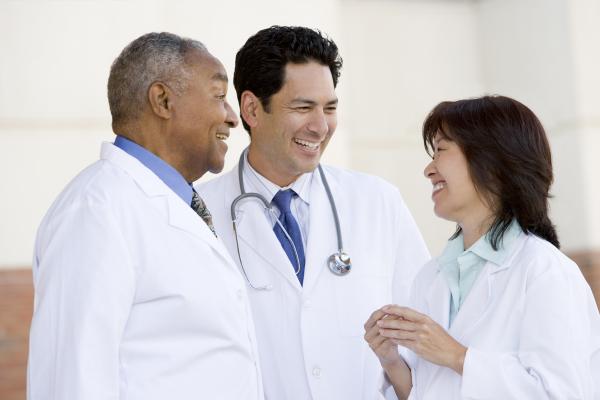A Protrusion at the Outside Base of the Big Toe
A bunion is a protrusion, or bump, that forms on the outside edge of the big toe where the toe bone meets the foot bone (called the metatarsophalangeal joint).
Bunions are the result of the big toe pointing toward the second toe. You can inherit a type of foot shape and structure – such as flat feet – that makes you more prone to this. Or it can be caused by certain types of arthritis or a genetic joint deformity. In addition, frequently wearing narrow, high-heeled shoes can force the big toe toward the second toe, speeding up the development of or worsening bunions.
Symptoms, Diagnosis and Outlook
The signs and symptoms of bunions are:
- A red, thick bump at the outside base of the big toe
- A big toe that turns inward and may cross over or under the second toe
- Corns and calluses
- Pain and stiffness at the first metatarsophalangeal joint
- Trouble fitting into shoes or wearing shoes without pain
- In advanced bunions, foot deformities that make it difficult to walk
Your orthopaedic doctor or podiatrist can diagnose bunions through a physical exam. Sometimes an X-ray is also completed to further evaluate the toe and foot bones and joints.
Bunions can be managed well with self-care methods like not wearing narrow, high-heeled shoes and using spacers, foam pads or inserts found over the counter at your local pharmacy. However, you may need bunion surgery if your bunion pain makes it difficult to walk. Bunion surgery is often successful at reducing pain.
Experts in Care
Meet our doctors, view their profiles and select the one that’s right for you.
Find a doctor near youWhy Choose Penn State Health for Care
Top-Ranked by U.S. News & World Report
Penn State Health includes the Milton S. Hershey Medical Center, ranked as one of the best orthopedic providers in the country by U.S. News & World Report. This honor was earned because our doctors consistently deliver exceptional patient care and outcomes through their commitment to advanced treatments, translational research and provider training.
Coordinated, Specialized Care Through a Dedicated Institute
Our orthopaedic specialists work together through our dedicated Penn State Bone and Joint Institute. There, they focus on providing you with multidisciplinary, tailored care and state-of-the-art treatments and technologies. This produces the highest-quality patient outcomes. All physicians at the institute are fellowship-trained and subspecialize in additional niche areas of orthopaedics, including arthritis care and joint arthroplasty (joint replacement surgery).
Designated as a Blue Distinction® Center
Penn State Bone and Joint Institute is a Blue Distinction Center for Knee and Hip Replacement. This superior designation from BlueCross BlueShield is only given to health care facilities and providers that stand out for their expertise in delivering specialty knee and hip replacement care. Our surgeons specialize in a range of pain-relieving procedures, including partial knee replacement, total joint arthroplasty, joint preservation surgery and complex revision surgery. They perform more than 1,000 joint replacement procedures every year.
Confidence in Treatment Through Education
We developed a special joint replacement education website just for patients undergoing joint arthroplasty. The website takes you step by step through the joint replacement process. From things to consider before choosing surgery to recovery after surgery, you’ll find the information you need to help you feel confident in your decision to undergo joint replacement.
Advancing Orthopaedic Medicine Through Research
The doctors and researchers in our Center for Orthopaedic Research and Translational Science at the Milton S. Hershey Medical Center are committed to advancing our field through scientific discovery and education. As the only academic medical center in central Pennsylvania, Hershey Medical Center is a national leader in research, in partnership with Penn State College of Medicine, and on the leading edge of new treatment options, including clinical trials.
Support Groups
Support groups provide an opportunity to share your feelings and connect with other patients and caregivers who are experiencing similar struggles.
Convenient Locations
Find the care your family needs, close to home, at one of our many locations throughout central Pennsylvania.
Find a location near you



